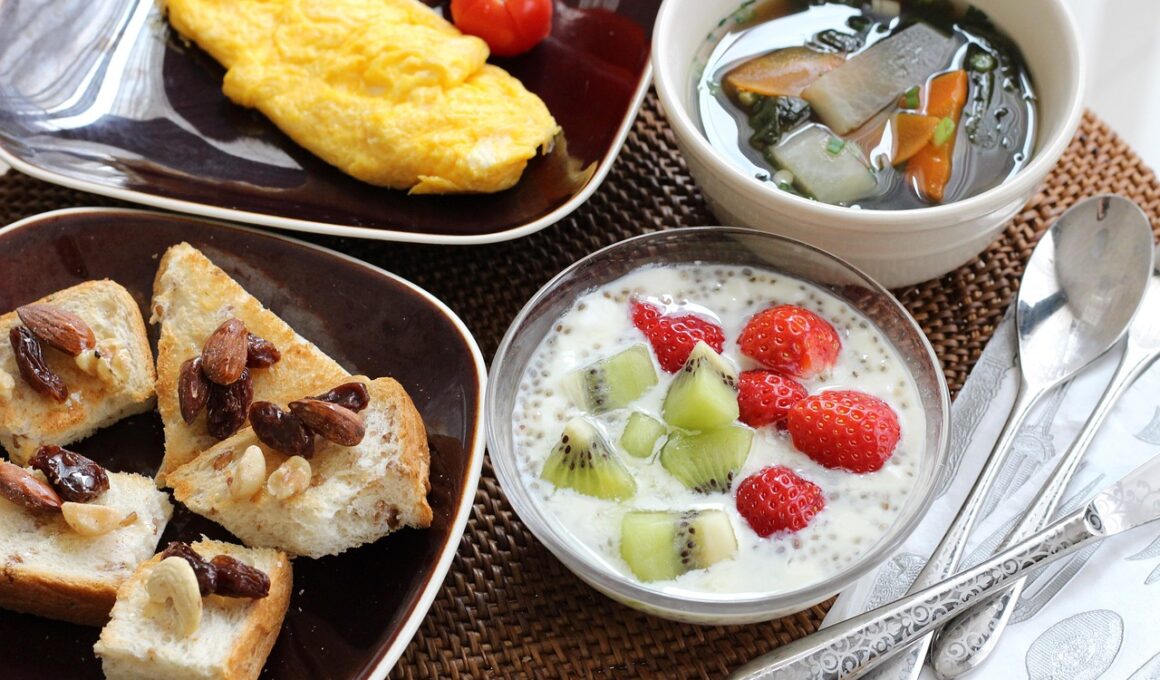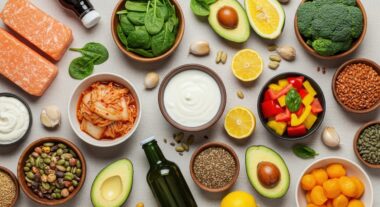Top 10 Nutrition Tips to Enhance Your Balance and Coordination
Achieving optimal balance and coordination requires not just practice but also the right nutrition. Start by incorporating plenty of fruits and vegetables into your diet. These provide essential vitamins and minerals that support muscle function and overall health. Aim for a colorful plate, as different colors typically represent various nutrients that your body needs. For example, leafy greens such as spinach and kale are packed with iron, which is vital for oxygen transport in the body. Omega-3 fatty acids found in fish like salmon and walnuts support brain health, which is vital for balance and coordination. Hydration is equally important; drink plenty of water throughout the day. Dehydration can lead to lethargy and decreased concentration, negatively impacting physical performance. Opt for whole grains instead of refined ones. Whole grains provide long-lasting energy necessary for sustaining physical activity. Nutrition should be viewed holistically, considering all food groups to maximize your performance. By focusing on these aspects, you will notice improvements in your balance and coordination. Regularly assess your dietary habits to ensure you are fueling your body properly.
Another critical aspect of nutrition for enhancing balance and coordination is protein. Consuming sufficient protein helps build and repair muscles, ensuring that you have the strength necessary to maintain stability during movement. You can find high-quality protein sources in lean meats, eggs, legumes, and dairy products. Furthermore, consider the role of carbohydrates, which provide the quick energy necessary for dynamic physical activities. Incorporate complex carbohydrates such as brown rice, quinoa, and whole wheat products into your meals. These will release energy gradually and prevent fluctuations in blood sugar levels. This stable energy source enables better focus and control over your movements. Additionally, don’t forget healthy fats; they play a crucial role in cellular function and hormone production. Foods like avocados, nuts, and seeds are excellent choices. Moreover, timing your meals is also essential; consuming balanced meals before and after exercise can directly impact your performance and recovery. Small snacks that include a mix of nutrients can provide the necessary boost before activities. Keeping a food diary may also help you stay on track and achieve desired outcomes.
Hydration and Its Importance
Maintaining proper hydration is vital for peak physical performance and is critical in enhancing balance and coordination. Water regulates bodily functions, facilitating nutrient transport and aiding in muscle recovery. Dehydration can impair cognitive functions, negatively affecting your ability to maintain balance. Symptoms may include dizziness and fatigue, both detrimental to physical activities requiring coordination. Aim for at least eight glasses of water a day, and more if you are active. Check for signs of dehydration, like dark urine or dry mouth. Performance can suffer significantly when not adequately hydrated. Another good option is electrolyte-rich drinks. These replenishing beverages help restore essential minerals lost through sweat during workouts. Your diet should also include water-dense foods such as cucumbers, watermelon, and oranges to boost hydration. Snacking on these will hydrate you while providing vitamins. Furthermore, you might consider incorporating herbal teas or coconut water as alternatives to sugary drinks. While they can act as a hydration aid, they also offer additional nutrients. Make hydration a top priority, and you will likely see heightened physical performance, improved balance, and overall well-being.
In addition to hydration, avoid excessive caffeine and alcohol, as both can lead to dehydration and negatively affect coordination. Alcohol can impair judgment and motor skills, so moderation is key. When consumed excessively, caffeine can create jitters, leading to instability. If you need a caffeine boost, opt for a small cup of green tea. This beverage provides less caffeine than coffee and includes antioxidants beneficial for overall health. If balance and coordination are your goals, pay close attention to how food influences your body. Monitor how different snacks and meals affect your performance. Pay particular attention to meals before activities, as timing can significantly affect energy levels and focus. Having a banana or a handful of nuts before a workout can provide a quick energy boost. Additionally, consider utilizing supplements. During periods of increased activity, multivitamins may play a role in ensuring you meet your nutritional needs. Consult with a healthcare professional before starting any new supplement to confirm they fit well. The right nutrients are foundational to enhancing balance and coordination effectively.
Portion Control and Balanced Meals
Implementing good portion control is also essential when aiming for improved balance and coordination. Consuming balanced meals can help maintain a steady energy level, ensuring that you won’t experience crashes during physical activities. A well-structured plate consists of a mix of proteins, healthy fats, and carbohydrates in appropriate portions. For example, fill half your plate with colorful vegetables, while a quarter goes to whole grains and the remaining quarter to lean protein sources. It’s an ideal way to ensure that you provide your body with what it needs for stability and coordination. Experiment with different meal plans to see which combinations work best for you. Meal prepping ensures that you have nutritious options available all week long. By making healthy meals in advance, you avoid the temptation of fast food or overly processed snacks. Furthermore, during meal times, practice mindful eating. Concentrate on your food instead of multitasking, as this can help you recognize when you’re full. Engaging your senses creates a healthier relationship with food, allowing you to make better choices conducive to your goals of improving balance.
Consider the timing of your meals as well. Eating small, frequent meals throughout the day versus large ones can help regulate energy levels. This strategy is beneficial for both concentration and physical performance. To aid in digestion, allow time between meals and physical activities. A good rule of thumb is to eat a balanced meal two to three hours before exercising. After a workout or physical activity, refuel your body with a combination of protein and carbohydrates to facilitate recovery. Consuming foods like Greek yogurt with fruit can promote muscle recovery and offer energy. Emphasize whole food sources over processed ones to maximize nutrient intake. Processed foods often come with excess sugars and unhealthy additives that can hinder physical capability. Instead, stock your kitchen with wholesome ingredients. Planning meals allows you to introduce variety, ensuring that you receive essential nutrients consistently. Balance is not just on a plate; it extends to the way you manage your overall diet. Catering to your body’s needs will promote better physical performance over time.
The Role of Micronutrients
Don’t overlook the importance of micronutrients in your diet; vitamins and minerals are critical for maintaining balance and coordination. Many essential micronutrients support muscle contractions and heart health, directly affecting your ability to remain stable. For instance, magnesium is vital for muscle function and can be found in nuts, seeds, and green leafy vegetables. Iron is another important mineral, as it plays a crucial role in oxygen transport within the body. This can significantly influence your stamina and energy levels during physical activities. To ensure you get a variety of micronutrients, focus on consuming diverse foods. Eating a range of whole foods allows for a wide spectrum of nutritional intake. Think about incorporating a rainbow of fruits and vegetables into your meals, as each color usually corresponds to different nutrients beneficial for health. Micronutrient deficiencies are common but can easily be avoided with proper dietary planning. Be mindful of food labels to recognize what you are consuming if you choose processed foods. In contrast, embracing whole foods will generally ensure that you minimize this risk while effectively enhancing coordination and overall health.
Ultimately, achieving better balance and coordination relies heavily on how well you fuel your body. Nutrition is vital during this process, empowering all physical activities. As you incorporate these nutrition tips into your daily routine, monitor your progress and note any improvements. It can also be beneficial to seek support from a nutritionist or a dietitian. These professionals can help tailor a diet that meets your specific needs, emphasizing foods that boost your balance and coordination. Beyond nutrition, supplement your dietary efforts with regular physical exercise. Activities such as yoga and Pilates can improve body awareness and control, thus contributing to overall stabilization. Consistency is vital for lasting results; adhere to healthy eating habits and physical routines. By making educated choices, you will pave the way toward improvement over time. Lastly, don’t forget to celebrate small victories throughout your journey. Recognizing achievements will motivate you to continue striving toward your goals. Good nutrition combined with mindful physical practices will transform your coordination capabilities and mental clarity; therefore, making a concerted effort to stick to this plan will yield positive outcomes.





